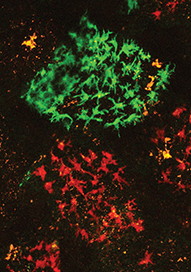A very thin difference separates, sometimes, between healthy and sick. Thus, for example, the cells of the immune system that work in the digestive tract must maintain "indifference" (tolerance) towards harmless foreign substances that come from food, as well as towards billions of harmless bacteria that inhabit the intestines and play an essential role in the digestive process. At the same time, they must maintain vigilance so that they can react quickly against harmful bacteria and other disease agents.

Violation of this delicate balance can cause chronic inflammatory diseases, such as Crohn's disease or colitis (inflammation of the colon).
How does the immune system navigate this tightrope? This question was examined in the research of Prof. Stefan Jung with the research student Tegest Aychak and the research students (at the time) Dr. Chen Verol, and Dr. Alexandra Vallon-Eberhard, and the researcher Dr. Guy Shahar - all from the Department of Immunology at the Weizmann Institute of Science, and Dr. Dr. Eran Alinev, a doctor at the Institute of Gastroenterology at the Sourasky Tel Aviv Medical Center, who completed doctoral studies at the Weizmann Institute of Science.
Previous studies established the understanding that dendritic cells - a certain type of immune cells that are regularly found in tissues that are in direct contact with the external environment, such as the skin or the outer layer of the intestine - are responsible for activating and regulating the immune response. It also turned out that there are several types of dendritic cells. In the experiments carried out in vitro, it was discovered that different types of dendritic cells have different properties, which led to the assumption that each type plays a different role. However, to understand in detail and precisely the role of dendritic cells of different types, their activity must be examined in a whole animal, and so far only a few experiments of this type have been carried out.
By using methods previously developed in Prof. Jung's laboratory - which allow him to carry out genetic manipulations in dendritic cells and whole animals - the team of scientists was able to shed light on the important role played by two types of dendritic cells found in the intestine, and on how they work together to maintain the balance between tolerance immune and the outbreak of intestinal inflammation. The two types of dendritic cells do belong to the same family of immune cells, but the researchers discovered that they originate from two separate "founding fathers" - something that may explain the difference in their properties and functions.
The researchers created genetically engineered mice that do not contain dendritic cells at all. They then "implanted" a progenitor cell of a certain type of dendritic cells (monocyte) in one group of mice, and a progenitor cell of another type (non-monocyte) in a second group, and allowed these cells to differentiate and multiply into a new population of dendritic cells. The researchers discovered that in each of the groups of mice a population of dendritic cells of a different type developed - thus proving that the origin of the two types of cells is from a different progenitor cell. The scientists then approached the heart of the matter: what role does each type of dendritic cell play in the gut? They again created mice without dendritic cells, from three groups: in one group they allowed the regeneration of both types of cells, in the second group they did not allow the creation of any of the cell types, and in the third group they allowed the creation of only one type - the one derived from the monocyte progenitor cell. Mice are given food that contains a substance that damages the layer that protects the intestine, thus increasing exposure to bacteria and increasing the chance of developing intestinal inflammation.

The findings, published in the scientific journal Immunity, show that like a tightrope, the gut requires a delicate balance - in this case, between the two populations of dendritic cells - to perform its role properly. Therefore, two of the groups of mice - the one that contained both types and the one that contained neither of them - did not develop intestinal inflammation. As soon as the balance between the two types of cells was broken - in the group of mice that contained dendritic cells of a single type - intestinal inflammation occurred.
What exactly is the cause of inflammation? One of the immediate suspects is TNF - a substance whose overproduction causes inflammation during an immune response, which is involved in a variety of diseases in humans, including intestinal inflammation. To test the effect of TNF in the experimental system they developed, the scientists created mice that do not contain dendritic cells, and renewed the stock of dendritic cells again through the introduction of a monocyte progenitor cell. However, this time they damaged the ability of the cells to produce TNF. Unlike the previous experiment, these mice did not develop intestinal inflammation.
Prof. Jung: "Our results emphasize the importance of the balance between the populations of dendritic cells in the intestine as a condition for the proper functioning of the digestive system. Furthermore, we were able to prove the important role played by TNF produced in dendritic cells in the development of intestinal inflammation. Our findings show that the non-monocyte-derived dendritic cells prevent the inflammatory effect of the TNF-producing dendritic cells, which originate from monocytes. The new information we have provided about the identity of the progenitor cell that leads to the development of each type of dendritic cell may have medical significance: it is possible that in the future doctors will be able to influence the balance between the types of dendritic cells in the intestine, thus reducing the patient's susceptibility to intestinal inflammation. To reach this stage, a lot of additional research is needed, and a deeper understanding of the interactions of the dendritic cells with other immune cells - such as T and B cells, as well as with the bacterial population found in the intestine is required."

One response
A very interesting study, it would be nice if you would attach a link to the article, I guess it is this article:
Intestinal Lamina Propria Dendritic Cell Subsets Have Different Origin and Functions
Chemical substances we consume, the water we drink, the food we eat and other environmental effects are probably also related to the balance in the activity of the immune system in the intestine. In your opinion, is the relationship between the environmental effects and the activity of the immune system in the intestine a direct relationship or is the activity mediated by the intestinal flora and personal genetics only